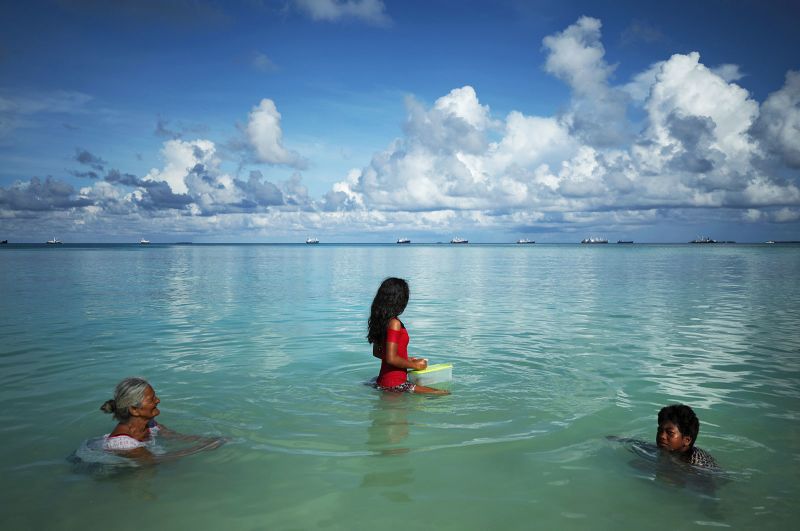More than a third of the population of Tuvalu has applied to move to Australia, under a landmark visa scheme designed to help people escape rising sea levels.
The island nation – roughly halfway between Hawaii and Australia – is home to about 10,000 people, according to the latest government statistics, living across a clutch of tiny islets and atolls in the South Pacific.
With no part of its territory above six meters, it is one of the most at-risk places in the world to rising seas caused by climate change.
On June 16, Australia opened a roughly one-month application window for what it says is a one-of-a-kind visa offering necessitated by climate change. Under the new scheme, Australia will accept 280 visa winners from a random ballot between July and January 2026. The Tuvaluans will get permanent residency on arrival in Australia, with the right to work and access public healthcare and education.
“The opening of the Falepili Mobility Pathway delivers on our shared vision for mobility with dignity, by providing Tuvaluans the opportunity to live, study and work in Australia as climate impacts worsen,” Australian Foreign Minister Penny Wong said in a statement.
According to Tuvalu’s Prime Minister Feleti Teo, more than half of Tuvalu will be regularly inundated by tidal surges by 2050. By 2100, 90% of his nation will be regularly under water, he says.
Fongafale, the nation’s capital, is the largest and most populated islet in Tuvalu’s main atoll, Funafuti. It has a runway-like strip of land just 65 feet (20 meters) wide in some places.
“You can put yourself in my situation, as the prime minister of Tuvalu, contemplating development, contemplating services for the basic needs of our people, and at the same time being presented with a very confronting and disturbing forecast,” Teo told the United Nations Oceans Conference this month in Nice, France.
“Internal relocation in Tuvalu is not an option, we are totally flat,” the prime minister said on June 12. “There is no option to move inland or move to higher ground, because there is no higher ground.”
The visa scheme is part of a broader pact signed between Australia and Tuvalu in 2023, which binds Australia to defending Tuvalu both militarily and against rising seas.
Tuvalu, which claims 900,000 square kilometers of the South Pacific, is considered by Canberra as a crucial player in its ongoing struggle with China for regional influence.
Recognition is something Australia has said it will guarantee for Tuvalu, even if nobody can live there in the future. “The statehood and sovereignty of Tuvalu will continue, and the rights and duties inherent thereto will be maintained, notwithstanding the impact of climate change-related sea-level rise,” their treaty reads.
In 2022, at COP27 in Sharm El-Sheikh, Egypt, Tuvalu announced that it sought to become the first nation in the world to move entirely online. The government has since developed a plan to “digitally recreate its land, archive its rich history and culture and move all government functions into a digital space.” Australia now recognizes Tuvalu’s “digital sovereignty,” which the country hopes will allow it to “retain its identity and continue to function as a state, even after its physical land is gone.”
Australia’s Prime Minister Anthony Albanese said last year his country shared a vision for a “peaceful, stable, prosperous and unified region.”
“It shows our Pacific partners that they can rely on Australia as a trusted and genuine partner.”
Australia’s support for the Pacific island nation has stood in stark contrast in recent months to US President Donald Trump’s administration, which has imposed sweeping crackdowns on climate policies and immigration.
Tuvalu is among a group of 36 countries that the Trump administration is looking to add to the current travel ban list, according to the Associated Press.
The ban fully restricts entry of nationals from 12 countries: Afghanistan; Myanmar, also known as Burma; Chad; Republic of the Congo; Equatorial Guinea; Eritrea; Haiti; Iran; Libya; Somalia; Sudan; and Yemen. People from seven countries also face partial restrictions: Burundi, Cuba, Laos, Sierra Leone, Togo, Turkmenistan and Venezuela.
The 36 countries, including Tuvalu’s Pacific neighbors Tonga and Vanuatu, had been told to commit to improving vetting of travelers and take steps to address the status of their nationals who are in the United States illegally or face similar restrictions, the AP reported, citing a diplomatic cable sent by the State Department.

